CRM for startups help build relationships with customers. Simply put, a good CRM can be the number one way to increase business revenue. Have you found yourself wondering whether you need a CRM software for your startup? You have reached the right place. I’m going to talk all about CRM Software and how they can help you. We will also take a look at the types of CRM and the problems it solves. I’ve also added a list of the best CRM for small businesses, so read on till the end!
In this blog:
- What is CRM software?
- What is CRM for startups or small business?
- Which are the types of CRM?
- 6 signs your small business needs a CRM software
- What startup problems does a CRM software solve?
- Key features of CRM
- What is Agile CRM?
- Which business applications should your CRM integrate with?
- The most important CRM for your small business: HRMS
- How to choose a CRM for your small business?
- Top 5 CRMs for small businesses
- Recap
- FAQs
What is CRM software?
CRM stands for Customer Relationship Management. It’s a no brainer then that it is one of the most important business software to invest in. At its core, CRM software encompasses all customer-oriented strategies and technologies. Moreover, it directly helps improve customer relationship management with existing as well as potential clients. So if content is king, the customer is basically the kingdom.
CRM software enables three main activities:
- Building customer relationships
- Creation of customer loyalty
- Retention of customers
I don’t have to tell you that all 3 of these are vital to business revenue. A CRM simply provides you with the interface and data to scale these 3 functions in an effective manner.
What is CRM for startups or small business?
While core of CRM will be the same for large or small company, CRM for startups have some unique features. Additionally cost plays a major role in the final choice for CRM software. Unlike large enterprises, small businesses do not have a dedicated team for software evaluation. Read on till the end as to how a small business can quickly evaluate the best CRM software. Finally the software implementation time and complexity plays a big role in the final decision for startups. A startup may not have dedicated custom implementation team so a highly flexible CRM software will do well. Finally, a CRM for startups which is cloud based also reduces operational hassles.
Which are the types of CRM?
CRM software can be differentiated into 5 categories:
1. Operational CRM
This CRM is called operational is because it supports operational activities. These include sales, customer service, and marketing automation. Operational CRM software structures contact information and set procedures that result in automated processes. Another feature of this CRM software is that it can integrate leads coming through different channels. This is possible due to integrations with MailChimp or Outreach which accelerate the sales cycle.
Two popular operational CRM software are Hubspot and Salesforce.
2. Analytical CRM
As the name suggests, this CRM software carries out customer data analysis. This data includes consumer preferences, interests, points of contact, etc. Furthermore, the analysis done can help to understand customer patterns through data mining. So you’re basically eliminating your chances of building incorrect user personas. How amazing is that!
The best examples of analytical CRM software are Zoho Analytics and Salesforce Wave Analytics.
3. Collaborative CRM
You guessed it, this one enables collaboration. Collaborative CRM software truly is the epitome of customer service. This is because they enhance information sharing across different departments. How many times have you felt pain at answering queries due to difficult inter-departmental communication? My guess is at least a few times.
For better customer interaction and management, try Pipedrive or Copper.
4. Campaign Management CRM
This CRM software basically helps run your marketing or sales campaign more efficiently. Since it is a blend of both, operational and analytical CRM, it provides both data and insights. As opposed to the operational CRM, you can use this one to run your campaign and then distribute it via email.
Have a look at Active Campaign if this functionality is more up your alley.
5. Strategic CRM
Strategic CRM software also focuses solely on customers. It provides consumer information to improve your relations with them in the long run. How does this happen? It practically customizes your relationships with customers.
If your business banks on long-term relations instead of short campaigns invest in this one.
6 signs your small business needs a CRM software
All this is well and good. But when do you need a CRM for startups or a small businesses? Don’t worry, I’ve got you covered.
1. Overwhelming Lead Flows
Having tens and hundreds of leads is wonderful. But what happens when those become thousands? You get flooded with leads. In such a situation, a CRM for startups helps you prioritize your leads. This not only makes taking actions on leads efficient but also results in an organized database of leads generated.
2. Complicated Consumer Database
Manual data collection methods such as excel work well in a business’s early stages. But as the business grows, you need to invest in smart tools. A CRM software acts as the singular source for data access. This can drive success rates while at the same time retaining customers by making quick decisions.
3. Sales Ambiguity
With the sales team more or less on the road, it can be hard to keep track of progress. A good CRM software allows for real-time updates across devices. In addition, it helps to forecast future sales and resource allocation.
4.Poor Customer Service
Getting a customer is just half the work, keeping them is the main challenge. If your business is becoming more of addressing complaints and less of the above-par service delivery, get a CRM now. Effective customer retention begins with ease of managing case flows alongside customer service. A powerful CRM software routes cases to the corresponding agents thus increasing efficiency. At the same time, setting up customer-based communities enable them to answer their own queries.
5. Account Management
All clients are different. Customers that have been associated with you for a long time require more attention and appreciation. But it doesn’t have to be as tedious as it sounds. A CRM software system can remind you of special events and milestones. Thus, you can send your valuable customers’ personalized communication on time. This shows that you care and are grateful for their support and business.
6. Inefficient Reporting Processes
As I said a while ago, avoid using manual processes. Manual data entries take up too much time and are prone to human error. The best part about CRM systems is that they not only store data in one place but also break down reports into minute details. Therefore, there is an increased scope for accurate data analysis and reporting.
What startup problems does a CRM software solve?
CRM software helps solve several business problems. Continue reading to find startup-specific problems a CRM solves for. Here are some of the pain points a CRM for startups helps with:
-
Workflow Management
Organizational information is often inaccessible and fragmented. This is the reason why a lot of the data is rendered useless. The biggest benefit of a CRM for startups is its central data access point. Another advantage is that it can update customer data with ease. As a result, all sales information stays up-to-date. All of these factors make for an organized, simplified, and efficient workflow.
-
Slow Growth
Yes, software can affect business growth levels. More often than not, an ineffective sales funnel is to be blamed. A CRM tool consolidates the funnel resulting in increased sales. Again, how does this magic happen? It begins with a customer call after which the CRM tracks all communication details. By storing the customer’s data, it allows for easy search history and task follow-ups.
-
Social Media Insights
Everyone knows the power social media can have on brand visibility and revenue. A lot of companies lose out on important conversations with their audience on social media. CRM for startups can be integrated with Social Analytics to analyze consumer demands and increase brand awareness.
-
Customer Success
This is the most important step in a customer relationship journey. Customer success is defined as the process of providing solutions to customer queries by forecasting them beforehand. This kind of strategic planning increases customer satisfaction, loyalty, and retention. As a result, you also boost your business revenue. The ways in which customer success is achieved typically consists of providing consumer experience, up-selling, and cross-selling. CRM for startups enable collaborative effort between the support, sales, and product teams.
-
Customer Service
Customer service can be best expressed by the support you provide your customers before and after they use your product. Moreover, it is a time-sensitive activity and includes technical support and building a strong knowledge base. There are multiple ways of providing customer service. These include support over the phone, email, live chats, and even social media. Customer service is definitely one of the key components of developing brand loyalty which can be improved upon using CRM for startups.
Key features of CRM
Not every CRM has all features. But most software tend to have variations of functionalities across 7 main areas:
1. Customer Support
This is the first and foremost feature of CRM for startups or big businesses. Since provision of customer support is intricately linked with building relations, most CRM software tend to have most of support features. These include:
- Case management techniques
- 24*7 customer service portal
- Live chat or call center support
- Rich knowledge base with listed FAQs
- Dedicated support analytics options
2. Sales Automation
Another key feature of most CRMs is the enablement of automating sales processes. Thus, it helps save valuable saves time which would otherwise be spent on administrative tasks. Sales automation involves the streamlining of manual or tedious tasks such as data entries. However, it can also include several other functionalities:
- Contact management
- Account management
- Pipeline management
- Task management
- Product and Price management
- Order management
3. Marketing Automation
Marketing automation refers to any technology that can help a business to market on different online channels. This is again a time-saving feature as it automates repetitive tasks. Marketing processes that a CRM software can automate include:
- Email marketing
- Lead management
- Marketing campaign management
- Data analysis of marketing efforts
4. Reporting Measures
Most CRMs will also have dedicated dashboards to display different data reports and analytics. These not only help understand business outcomes but also predict future sales through forecasting options.
5. Mobile and Social Support
Mobile devices generate about 51.3% of global web traffic. This makes it imperative for software like CRMs to be designed for mobile support. In the same way, CRMs must also have features for collaboration on social media platforms such as Instagram, Twitter, Facebook, etc. An added social network integration ensures that you are making the most out of information sharing through social media.
6. Integration
This feature includes but is not limited to tools for data import and exports. A good CRM software will also have integration application programing interfaces (APIs) and the option of integrating with a large range of third-party applications.
7. Platform
For any software, its platform is the deciding factor for how it supports user interaction. Let’s go over a few fundamental CRM platform attributes:
- Customization
- User and Access Management
- Test Environments
- Content Management
- Overall Performance
- Document Generation
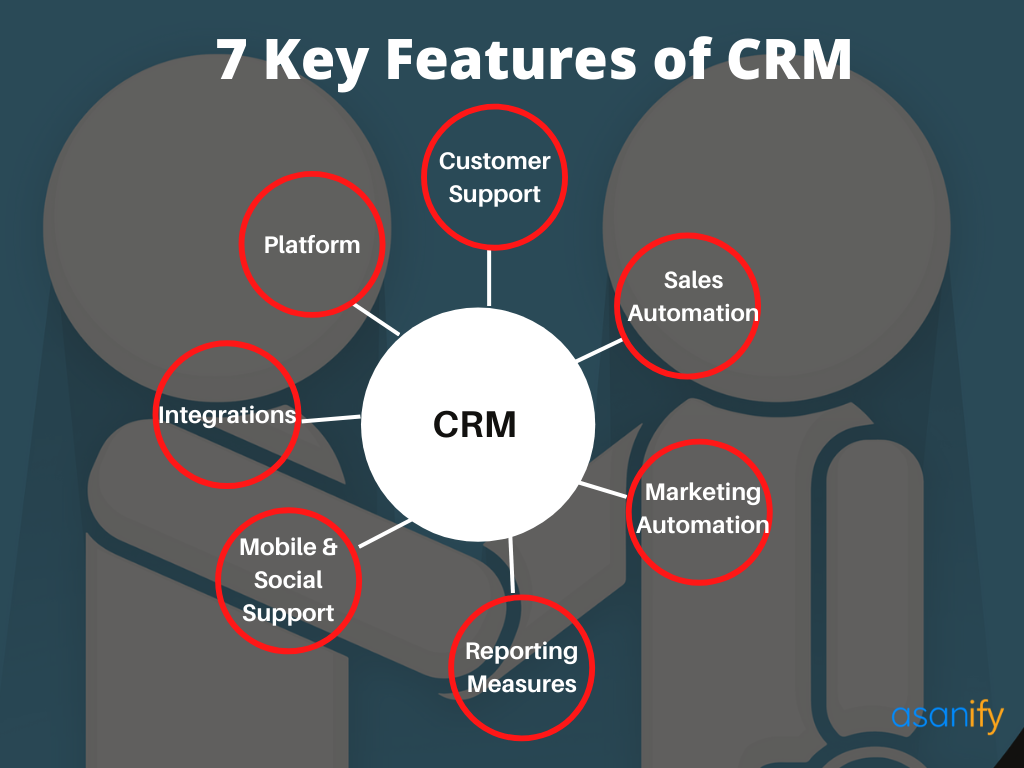
What is Agile CRM?
Agile CRM delivers all the startup solutions on a single platform. Everyone in your system—sales reps, marketers, customer support reps—has access to all of the data from their colleagues, all contained on a single page with an overall view. Everyone shares the same insight, from one source of data truth.
You get a slick, customizable, highly-intuitive user interface designed around ease of use for the end user.
Features of Agile CRM:
All-in-One CRM
Automate your sales, marketing, and service in one platform. Avoid data leaks and enable consistent messaging.
Affordable
Make the most of Agile’s modern features & integrations, easy implementation and great support at an affordable price.
Next-Generation
Cloud based SaaS service that is mobile-ready, fast, and simple to use.
Which business applications should your CRM integrate with?
In the previous section, we discussed how a key feature of CRM is its ability to integrate with applications. Let’s look at some crucial applications your CRM software must work with.
Integrate your website with CRM
A CRM software thrives on data. A lot of companies fail to pay attention to the most important integration of all. Your Business Website!
Website integration takes place with all kinds of software; CRMs, accounting solutions, payment gateways, etc. Merging your CRM with your website provides for better customer experience as it puts them on the centre of your service delivery.
In addition, it helps in enhanced profiling of your website visitors. This happens through the process of collecting information on the website through contact or inquiry forms. Not just that, integrating CRM with a website can earn you more sales through the chances of getting accurate customer data. As a result, you can get better leads that improve conversion rates.
How to integrate CRM with WordPress?
WordPress has a number of CRM plugins that you can choose from. While looking for one, make sure that it has a contact capture system to build forms, widgets, etc. Also, check for messaging tools and reporting modules. Another thing you want in your WP CRM plugin is filtering and search bars along with integration extensions to link to other CRMs or platforms.
Some of the best CRM plugins for WordPress are:
- WordPress CRM Plugin
- HubSpot
- Web-to-Lead for Salesforce
- Bitrix24 CRM
- Contact Form 7 Zoho
Why should you integrate CRM with ERP?
ERP or Enterprise Resource Planning is a software that integrates all your operations in one place. Both ERP and CRM are very powerful business tools on their own. So it’s no surprise that together they’re the ultimate cohesive unit. Here’s why you should integrate ERP with CRM:
1.Comprehensive Customer Views
ERP and CRM software provide end-to-end visibility for your business. Since they both work on collecting tons of data, you can get all the information you need about your customers. This includes sales, marketing, or just an overall consumer picture.
2.No chance for duplicate data
Without this software combination, you will probably be left with duplicate data. This is not only wasteful but can also make you question which record is the original. By integrating CRM system with ERP, you are reducing the scope for duplicate or inaccurate data for more efficient data processes.
3.Quicker Sales Approvals
Yes, it’s possible. With this duo, you can live your same-day signing dreams. This is because of the real-time data access that the software provides to your sales team. Because all the data is centralized, deals can be accelerated and converted faster.
Benefits of integrating Slack with CRM
Everyone’s favourite productivity tool, Slack works great with a CRM system. The best thing about this pair is the notifications and alerts options. As a manager, you can use your CRM to send daily sales reports to you on Slack. Moreover, you can notify your team when a customer changes billing plans if you’re currently using a SaaS product. What’s more, you can even celebrate closing deals by sending messages on Slack from data retrieved by your CRM.
CRM integration with MS Teams
Another popular choice, MS Teams also works effectively when integrated with CRM software. MS Teams is known for its ease of collaboration. By integrating it with a CRM, team members can have access to the CRM dashboard instantly. Additionally, CRM system records can also be shared as cards in MS Teams conversations.
WhatsApp and CRM integration
Facebook-owned WhatsApp is the world’s number one messaging platform. The way this particular integration works well for sending template messages from the CRM system to a selected queue of contacts on WhatsApp.

With increasing personalization, there is a real need for a more robust CRM system – both for large and early-stage organizations. The need to capture customer interactions i.e. Likes, Shares, Feedback, CSAT scores etc. is far more important today than just their Purchase transaction details. Lifecycle management in the true sense will be impossible without this.
Gaurav Prasad, Head, Privilege Program, VFS Global
The most important CRM for your customers: HRMS
We’ve spoken a lot about establishing and managing customer relationships. But what is often overlooked is the fact that the first customer business has, is its employee. This is especially true for startups where an employee can potentially make or break the company. Therefore, it is not enough to have effective client communication, there must also be strong employee relationships.
But which one should you get first: HRMS or CRM?
The short answer is, HRMS. Let me tell you why. Customer relationship management software is frankly pointless without an HRMS. This is because an HRMS allows for improved access to employee information which is necessary for a CRM to function. Any kind of data must first exist in the HR database for it to be used in sales transactions and customer servicing.

Now let’s see why these two work well together:
-
Profile Management
By integrating CRM into HRMS, you are making a way for organized profile management. This includes employee profiles and user information. This data is useful when entered into a CRM as it can be used for better sales processes. Thus, the combination of a CRM and an HRMS is the only one a business really needs for efficient operations.
-
Onboarding
Let’s take an example of your sales team. Think about what a pain sales onboarding can be. With an integrated CRM-HRMS, here’s what happens. Your CRM already has sales data and relevant contact information. When you add that with an HRMS that provides learning resources, you get a hassle-free process.
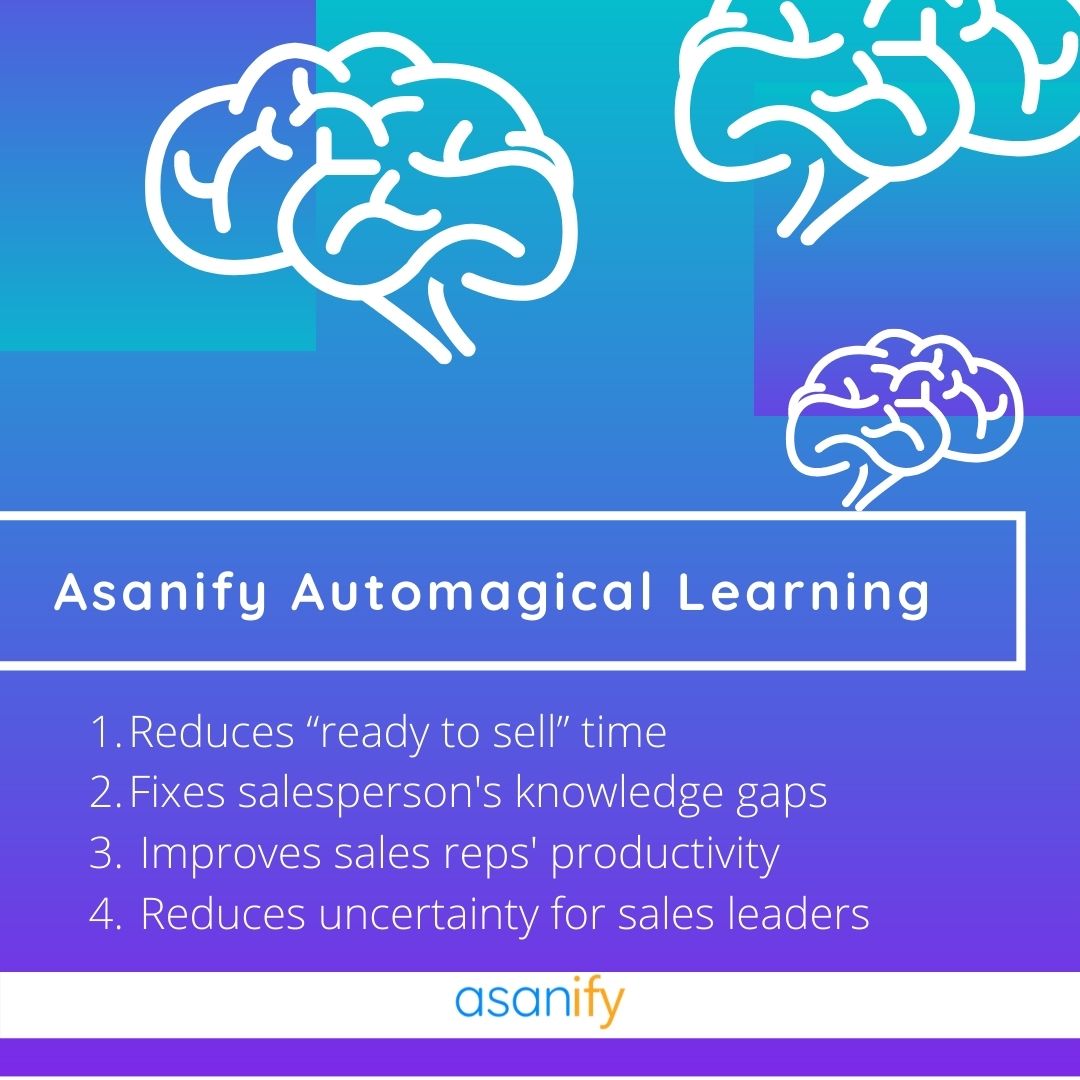
-
Performance Management
All your employee records are stored within a CRM software. This gives you insights into employee performance and how they have fared with respect to their targets. Consequently, this tells you about overall customer experience. These key performance insights can be used by HR heads for final bonus payouts to the sales team.
Asanify’s HRMS is the best integration for your CRM software.
- Provides complete automation for all your HR processes so that you can use it to manage your employees effectively.
- Supports remote onboarding and uses AI to build a rich knowledge base for all your training purposes.
- Makes the entire employee experience seamless with its integrations with Slack, MS Teams, Excel, etc.
- Its unique HR chatbot helps keeps employees engaged right from day one.
- Custom Integrations with ERPs
How to choose a CRM for your small business?
-
Scalable Features
Every organization has unique processes, needs, and customer demands. You can’t spend on different CRM software over and over again as your business increases. Instead, invest in a system that is scalable. Before spending on a CRM, do your research on whether that model will be able to upgrade easily. Additionally, don’t get carried away by all the fancy features. Reports suggest that first-time CRM buyers often overestimate the functionalities they need. Look for features such as Outlook Integration along with basic ones like contact management. Evaluate the list of features based on your business needs and not on what’s trending.
-
Ease of Integration
Although CRM software has loads of benefits as a standalone product, it can truly be maximized only through integrations. Because you’re getting it to streamline processes, not to create separate work systems. With increasing remote working, this criterion is the most important one to consider. Here are some of the most important incorporations to look out for:
- Outlook with CRM
- CRM with G-Suite
- CRM with Microsoft Office
- Excel with CRM
Ease of Use
This one is crucial for all kinds of software. You want a CRM system that is intuitive and enjoyable to use. Moreover, there must a logical flow of action and task execution. It should also fit in with existing operations and kind of daily usage. The best way to test this out is by involving a sales member or customer service rep since they will be the primary users.
-
Industry-specific vendor
Your business may be part of a very general or extremely specific industry. Since CRM seeks to improve business operations, you need a seller who understands your industry well. Lookup vendor websites to get an idea of what businesses they cater to. Also, check whether the seller has sufficient CRM experience. In addition, a vendor with a local network can provide help after implementation as well.
-
Training and Support
When installing the CRM, ensure that you focus on ease of configuration and ask for customizations. Your business has its own growth and customer dynamic so ask for personalized training sessions instead of basic online tutorials. Always ask for support hours and additional costs. Furthermore, get a CRM solution that is easy to operate across organizational levels.

Top 6 CRMs for small businesses
1. Zoho CRM
Zoho CRM is an all-in-one CRM for startups and small businesses. It includes email, phone, social, and live chat communication channels. The software allows for social media analytics and account management. It also has advanced selling tools such as deals and leads.

2. Salesforce
Salesforce has the best brand recognition when it comes to CRM software. Some of its features include workflows and approvals, sales automation and contact management.

3. Agile CRM
This one focuses more on lead management and marketing automation. It helps to close more deals through its contact and nurturing analytics. Agile CRM also includes email and campaign tracking and templates for marketing channels.
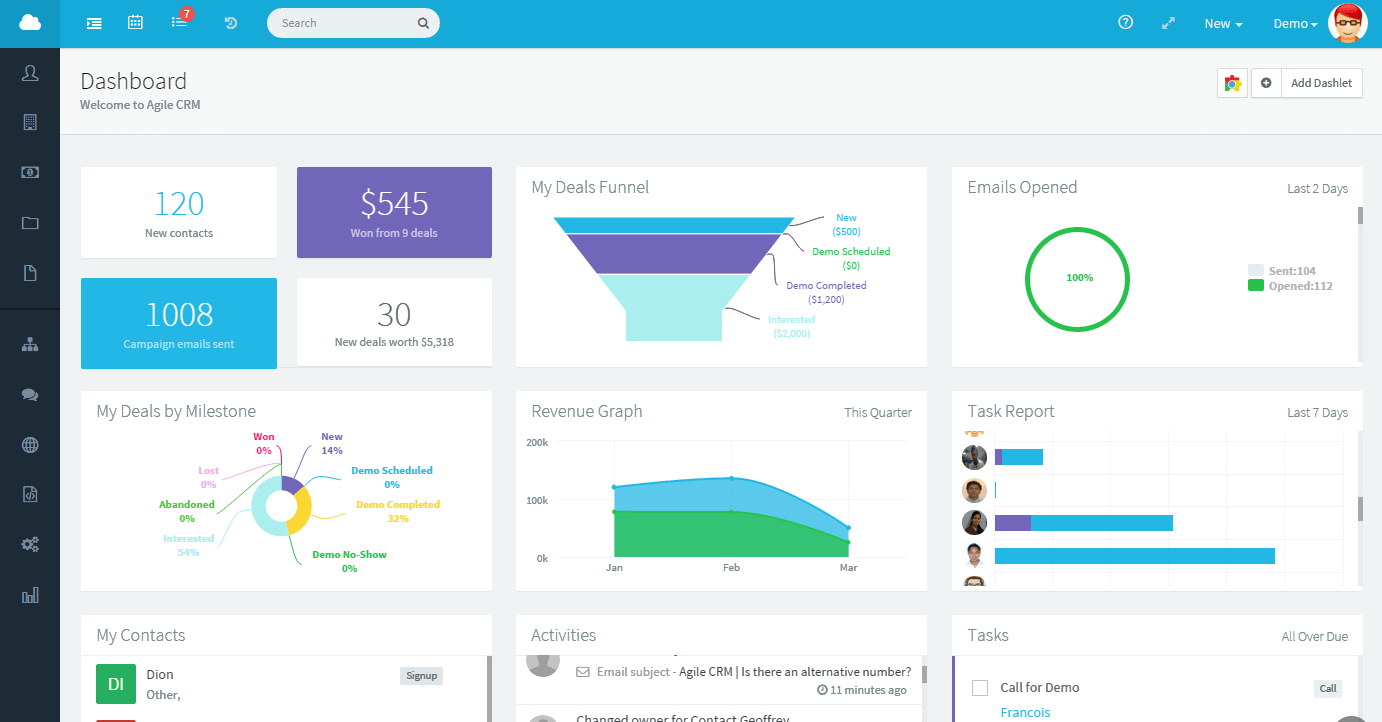
4. Hubspot
Hubspot provides features such as deal management and lead capture forms for budget-conscious startups. It has a built-in scheduler for meetings and is free for unlimited users.
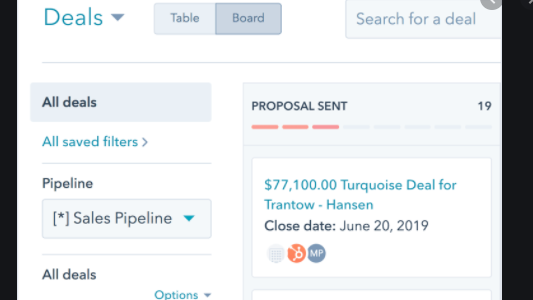
5. Salesflare
Think your team will never use a CRM because it’s too hard and too much work? Enter Salesflare: it’s a simple yet powerful CRM for small and medium-sized businesses that sell B2B. It automatically fills out itself by integrating closely with Google Workspace and Microsoft Office 365. And if you’re prospecting a lot, you’ll probably also enjoy its LinkedIn extension. Your sales team will love it.
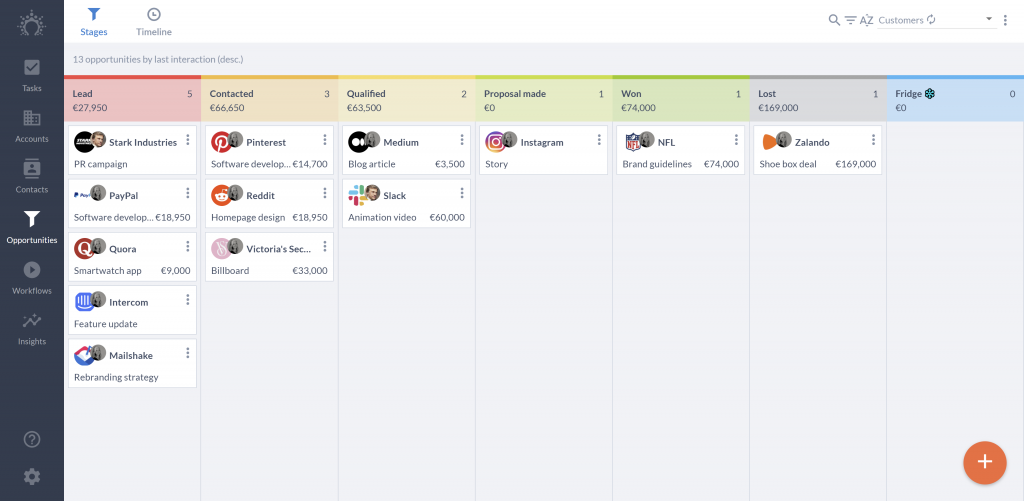
6. Insightly
Insightly is known for its intuitive interface. Furthermore, it is easy to use and affordable and has the keyword, contact, and project tags. As a result, it enables fast search options and information sharing.
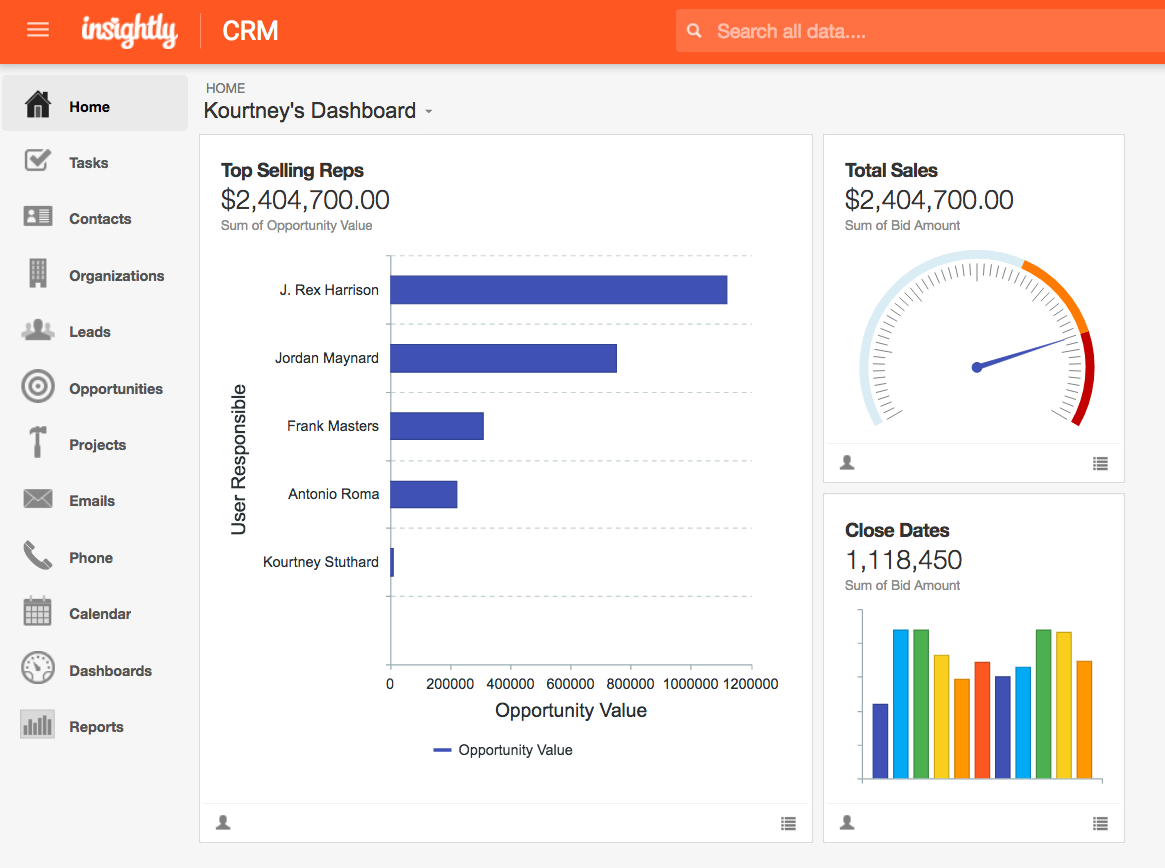
Recap
Let’s have a quick wrap up of all the things we’ve talked about today:
- Understood unique needs for a startup towards a CRM.
- Understood the definition, types, and examples of CRM software.
- Established the 6 signs of when you need to think of investing in CRM.
- Got insights into the kind of business problems a CRM can help solve.
- Outlined the most critical software integration of HRMS and CRM.
- Outlined the key criteria on how to choose a good CRM. Additionally, we looked at the top 5 global CRM systems.
FAQs
CRM stands for Customer Relationship Management. It is basically a software that improves customer relations, increases sales, and streamlines operations.
There are 5 main types of CRM software. These are:
1. Operational CRM
2. Analytical CRM
3. Collaborative CRM
4. Campaign Management CRM
5. Strategic CRM
CRM skills revolve around sales and marketing funnels, and customer relationship management. It automates processes and acts as a central information and profile database.
Any business should invest in a CRM, regardless of size and revenue. This is because it helps in making core functions efficient and saves time.
Not to be considered as tax, legal, financial or HR advice. Regulations change over time so please consult a lawyer, accountant or Labour Law expert for specific guidance.


![Read more about the article [20] Performance appraisal methods: Here’s how to pick the best one!](http://3.219.171.151/wp-content/uploads/2022/04/blog-covers-2-1-300x169.webp)
